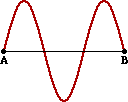What is the definition of elements.
each of more than one hundred substances that cannot be chemically inter-converted or broken down into simpler substances and are primary constituents of matter. Each element is distinguished by its atomic number, i.e. the number of protons in the nuclei of its atoms.
When a solid changes to a liquid it is called what?
For example, a solid may become a liquid. This phase change is called melting.When a solid changes into a gas, it is called sublimation. When a gas changes into to liquid, it is called condensation.
According to the article, how many elements are there in the current periodic table?
118
If the distance from point A to point B in the diagram is 60 cm, then the wavelength is ____.
a. 20 cm.
b. 40 cm.
c. 60 cm.
d. 90 cm.
Answer: B
If the radius of blood vessels of a person decreases his/her blood pressure will
Increase
Define what a compound is
a thing that is composed of two or more separate elements; a mixture.
When a gas changes into a liquid it is called what?
This kind of phase change--liquid to gas--is called evaporation or vaporization. Water vapor can in turn be cooled to form liquid water. This kind of phase change--from gas to liquid--is referred to as condensation.
What family of elements is in the right-most column of the Periodic Table?
The vertical columns on the periodic table are called groups or families because of their similar chemical behavior. All the members of a family of element shave the same number of valence electrons and similar chemical properties. The horizontal rows on the periodic table are called periods

13. How many complete waves are shown in the diagram?
a. 1
b. 2
c. 3
d. 1.5
Answer: D
Cell or tissue death within a living body is called as
Necrosis
What is the most common element in the universe?
Hydrogen
When solids reach their melting points they become what?
liquid
What family of elements is in the left-most column of the Periodic Table?
The left-most column, more properly known as a group, would be the alkali metals, with the exception of Hydrogen, which is in the category of “Other Nonmetals”, not the alkali metals (but is still in group 1).
A wave X meters long passes through a medium with a speed of Y meters per second. The frequency of the wave could be expressed as
a. Y/X cycles/sec.
b. X/Y cycles/sec.
c. XY cycles/sec.
d. (X + Y) cycles/sec.
Let d = wavelength. Since d*f = v, f = v/d.
Main use of salt in diet is to
produce small amount of hydrochloric acid required for digestion
What are atoms of the same element that have a different number of neutrons called?
Notice that the three hydrogen atoms have the same number of protons, but a different number of neutrons. These atoms are called isotopes, which areatoms of the same element that have a different number of neutrons.
When a gas reaches its condensation point it becomes a what?
liquid
What are the horizontal rows of the Periodic Table called?
In the periodic table of elements, there are seven horizontal rows of elements called periods. The vertical columns of elements are called groups, or families. (See also The Periodic Table: Metals, Nonmetals, and Metalloids.)
As a wave passes across a boundary into a new medium, which characteristic of the wave would NOT change?
Frequency
Fresh Yeast cells are good source of
Vitamin-B
What is the most common element in the universe?
Hydrogen
What is it called when a solid changes directly into a gas?
Deposition is the phase transition in which gas transforms into solid without passing through the liquid phase. Deposition is a thermodynamic process. The reverse of deposition is sublimation and hence sometimes deposition is called desublimation. ... This causes the water vapor to change directly into solid.
What is the name of the family of elements that has a full outer shell of electrons?
They are located to the far right of the periodic table and make up the eighteenth column. Elements in the noble gas family have atoms with a full outer shell of electrons. They are also called the inert gases. The elements that make up the family of noble gases include helium, neon, argon, krypton, xenon, and radon.
What is the amplitude of the wave in the diagram below?

a. 0.03 m.
b. 0.04 m.
c. 0.05 m.
d. 0.06 m.
A-0.03 m.
Leprosy bacillus was invented by
Hansen